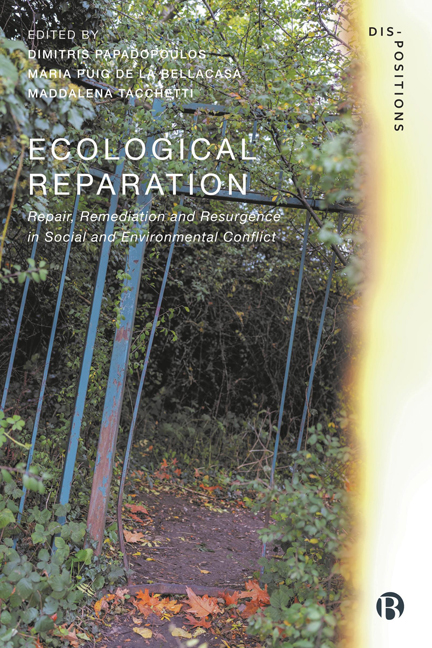Book contents
- Frontmatter
- Contents
- List of Figures
- Notes on Contributors
- Acknowledgements
- Note on the Figures
- Dis-Positions Series Preface
- Introduction: No Justice, No Ecological Peace: The Groundings of Ecological Reparation
- PART I Depletion<>Resurgence
- PART II Deskilling<>Experimenting
- PART III Contaminating<>Cohabiting
- PART IV Enclosing<>Reclaiming Land
- PART V Loss<>Recollecting
- PART VI Representing<>Self-governing
- PART VII Isolating<>Embodying
- PART VIII Growth<>Flourishing
- Index
3 - The False Bay Coast of Cape Town: A Critical Zone
Published online by Cambridge University Press: 28 March 2024
- Frontmatter
- Contents
- List of Figures
- Notes on Contributors
- Acknowledgements
- Note on the Figures
- Dis-Positions Series Preface
- Introduction: No Justice, No Ecological Peace: The Groundings of Ecological Reparation
- PART I Depletion<>Resurgence
- PART II Deskilling<>Experimenting
- PART III Contaminating<>Cohabiting
- PART IV Enclosing<>Reclaiming Land
- PART V Loss<>Recollecting
- PART VI Representing<>Self-governing
- PART VII Isolating<>Embodying
- PART VIII Growth<>Flourishing
- Index
Summary
Cape Town, the city that almost ran out of water in 2018, is usually presented in picture-postcard perfection to the global tourist market: Africa’s piece of Europe. Like a screenshot from Minecraft, in Google Earth Street View the landscape of the False Bay coast on the periphery of Cape Town is flat, unpopulated and blurred for lack of details that would be available from a ground-level photograph. The southern face of the city’s famous UNESCO world heritage landmark, Table Mountain, lies to the north-west in the earlier image. To the right are the hills that ring Table Bay in the Atlantic Ocean. Underfoot is sand that, not too long ago, was under the Indian Ocean, when carbon levels were as high as they are now.
In a city managed for much of the past decade by the centre-right Democratic Alliance, this is a side of the mountain unfamiliar, and off-limits, to the average tourist. This is the side in which the city’s many forms of slow violence multiply, not only in the sprawling settlements of the Cape Flats, an impoverished gangland that earns the city its reputation as one of the world’s most dangerous, but also in a number of sites of a failing hygiene and sanitation system. This includes a major water treatment works built by the Apartheid state in 1956 in which unlined settlement ponds on sandy soils leach sewage directly into the Cape Flats aquifer. Since the drought of 2018, these are now being lined. In March 2020, when the national government announced a strict policy of home-based quarantine and a ban on travel, the well-heeled tourists who feed the city’s public image and coffers disappeared from the northern seaboard. Also banned, in an effort to keep people out of the emergency rooms of hospitals, was alcohol; and so, in the south, mired in daily precarity, rates of street violence plummeted. With the spectacularity of its usual assaults temporarily slowed, the city’s attritional but also exponential slow violence came sharply into focus. Experienced by 40 per cent of the city’s inhabitants before the pandemic, hunger rose even more sharply as millions, crammed cheaply and dangerously into filthy informal shanty settlements and backyard shacks – barely affordable to those who hustle for a daily wage – tried to ‘stay home’ and ‘socially distance’.
- Type
- Chapter
- Information
- Ecological ReparationRepair, Remediation and Resurgence in Social and Environmental Conflict, pp. 50 - 72Publisher: Bristol University PressPrint publication year: 2023



